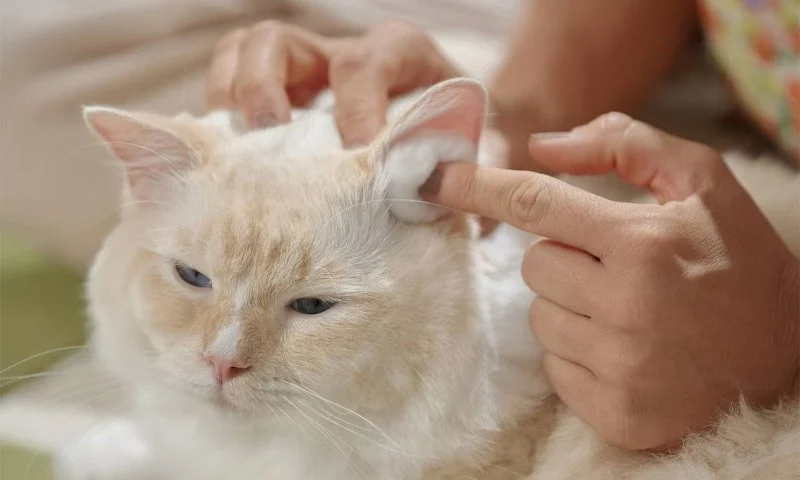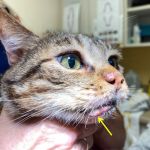
- 1- Introduction: Why Ear Care is Important for Kittens
- 2- Signs Your Kitten's Ears Need Cleaning
- 3- How to Safely Clean Your Kitten’s Ears at Home
- 4- Recommended Tools and Products for Ear Cleaning
- 5- When to See a Vet for Ear Problems
1- Introduction: Why Ear Care is Important for Kittens
As a pet parent, you want to make sure your kitten is healthy and comfortable. One often overlooked aspect of kitten care is ear hygiene. A kitten’s ears are delicate and can easily accumulate dirt, wax, and even infections if not properly cleaned. Regular ear cleaning is essential to maintain your kitten’s ear health, prevent discomfort, and ensure they are free from ear mites and other ear-related issues. In this guide, we’ll walk you through the best way to clean a kitten’s ears at home safely and effectively.
2- Signs Your Kitten's Ears Need Cleaning
Before you begin cleaning your kitten’s ears, it's important to recognize the signs that indicate their ears need attention. Here are some common signs your kitten’s ears may be dirty or infected:
- Excessive scratching: If your kitten is scratching its ears more than usual, it may be an indication of dirt or an infection.
- Odor: A foul smell coming from the ears can indicate an infection or buildup of wax and debris.
- Red or inflamed ears: Redness or swelling inside the ear may indicate irritation or infection.
- Dark discharge: If you notice a dark, waxy discharge, it could be a sign of ear mites or an ear infection.
If you notice any of these signs, it’s essential to take action and clean your kitten’s ears, or seek veterinary help if the symptoms persist.

Holistic Actions!
WestonWestern Connecticut Planning RegionConnecticut
49 White Birch Rd, Weston, CT 06883, USA
3- How to Safely Clean Your Kitten’s Ears at Home
Cleaning a kitten’s ears requires patience and care. Here’s a step-by-step guide to safely clean your kitten’s ears:
- Gather your supplies: Before you begin, make sure you have all the necessary items: a kitten-safe ear cleaner (recommended by your vet), cotton balls or gauze pads, and a towel to help keep your kitten calm.
- Calm your kitten: Kittens can be squirmy, so it’s important to have them in a calm environment. Hold your kitten gently, and if needed, have a second person assist you. Alternatively, you can wrap your kitten in a towel to help limit movement.
- Apply the ear cleaner: Follow the instructions on the ear cleaning solution. Typically, you’ll apply a few drops of the solution into your kitten’s ear canal. Make sure to avoid putting the tip of the bottle directly into their ear.
- Massage the base of the ear: After applying the ear cleaner, gently massage the base of your kitten’s ear for about 20 to 30 seconds. This helps loosen dirt and wax.
- Wipe away debris: Use a cotton ball or gauze pad to gently wipe the inside of the ear. Make sure to wipe only the visible areas and avoid inserting anything into the ear canal. Discard the cotton ball once it’s used.
- Repeat if necessary: If your kitten’s ears are very dirty, you may need to repeat the process once more. However, do not over-clean, as this could irritate their ears.
After cleaning, give your kitten a treat or some extra attention to ensure they associate ear cleaning with positive reinforcement!
4- Recommended Tools and Products for Ear Cleaning
To safely clean your kitten’s ears, using the right tools and products is essential. Here are some recommended items:
- Ear cleaning solution: Choose a kitten-safe ear cleaner, which can be found at most pet stores or through your vet. Look for products that are gentle and alcohol-free.
- Cotton balls or gauze pads: These are gentle on your kitten’s sensitive skin and can help you clean their ears without causing injury.
- Ear wipes: If you’re looking for a quick and easy solution, ear wipes designed for kittens can be a convenient option for regular maintenance.
Always consult your veterinarian before using any new products to ensure they are safe for your kitten.
5- When to See a Vet for Ear Problems
While cleaning your kitten’s ears is important, there are times when you should consult a veterinarian. If you notice any of the following signs, it’s best to schedule a vet visit:
- Persistent odor or discharge: If the smell or discharge from your kitten’s ears doesn’t improve after cleaning, it could be a sign of an infection or ear mites.
- Excessive scratching or head shaking: These behaviors may indicate pain or discomfort that requires professional evaluation.
- Redness or swelling: If the ear canal is inflamed or red, it may be infected, and you’ll need a vet’s expertise for treatment.
Routine ear checkups during your kitten’s wellness visits will help ensure any potential ear problems are caught early and treated appropriately.
For more tips on kitten care or to find the best ear cleaning products, visit Omnia Pet for expert advice and top-quality products!








 REPTILE FACTORY4.0 (351 reviews)
REPTILE FACTORY4.0 (351 reviews) Afghanistan / Pakistan Ink Finger Prints for Passports3.0 (2 reviews)
Afghanistan / Pakistan Ink Finger Prints for Passports3.0 (2 reviews) Petco4.0 (1297 reviews)
Petco4.0 (1297 reviews) Oaks Veterinary Urgent Care4.0 (100 reviews)
Oaks Veterinary Urgent Care4.0 (100 reviews) VIP Petcare Vaccination Clinic0.0 (0 reviews)
VIP Petcare Vaccination Clinic0.0 (0 reviews) Petco4.0 (867 reviews)
Petco4.0 (867 reviews) How to Tell if Your Kitten is Bonding with You
How to Tell if Your Kitten is Bonding with You Why Does My Kitten Bite My Fingers? Play Aggression Explained
Why Does My Kitten Bite My Fingers? Play Aggression Explained How to Help a Kitten with a Cold Sore: Essential Tips for Cat Owners
How to Help a Kitten with a Cold Sore: Essential Tips for Cat Owners How to Clean a Fish Tank Without Stressing Your Fish | Omnia Pet Guide
How to Clean a Fish Tank Without Stressing Your Fish | Omnia Pet Guide The Best Weight Management Diets for Overweight Cats: Expert Tips and Recommendations
The Best Weight Management Diets for Overweight Cats: Expert Tips and Recommendations Signs of Worms in Dogs and How to Get Rid of Them: A Guide for Pet Owners
Signs of Worms in Dogs and How to Get Rid of Them: A Guide for Pet Owners